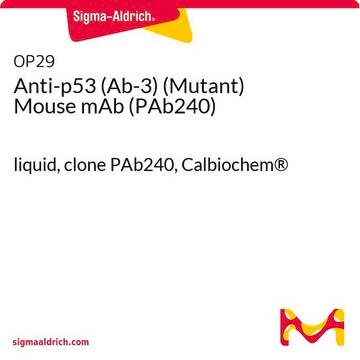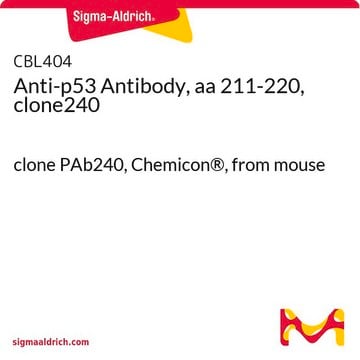MABE327
Anti-p53 (pantropic) Antibody, clone DO-1
clone DO-1, from mouse
Szinonimák:
Cellular tumor antigen p53, Antigen NY-CO-13, Phosphoprotein p53, Tumor suppressor p53
About This Item
Javasolt termékek
biológiai forrás
mouse
Minőségi szint
antitest forma
purified immunoglobulin
antitest terméktípus
primary antibodies
klón
DO-1, monoclonal
faj reaktivitás
human
technika/technikák
immunocytochemistry: suitable
immunofluorescence: suitable
immunohistochemistry: suitable
immunoprecipitation (IP): suitable
western blot: suitable
izotípus
IgG2aκ
NCBI elérési szám
UniProt elérési szám
kiszállítva
wet ice
célzott transzláció utáni módosítás
unmodified
Géninformáció
human ... TP53(7157)
Általános leírás
Egyediség
Immunogen
Alkalmazás
Immunohistochemistry Analysis: A 1:1,000 dilution from a representative lot detected p53 (pantropic) in human colorectal adenocarcinoma tissue and in human prostate cancer tissue.
Immunofluorescence Analysis: A 1:1,000 dilution from a representative lot detected p53 (pantropic) in human colorectal cancer cells.
Immunoprecipitation Analysis: A representative lot was used by an independent laboratory in radiolabelled HOS cell lysate (Vojtesek, B., et al. (1995). 71(6):1253-1256.).
Immunohistochemistry Analysis: A representative lot was used by an independent laboratory in primary breast carcinoma tissue (Beck, T., et al. (1995). Gynecol Oncol. 57(1):96-104.).
Epigenetics & Nuclear Function
Cell Cycle, DNA Replication & Repair
Minőség
Western Blot Analysis: 1 µg/mL of this antibody detected p53 (pantropic) in 10 µg of A431 cell lysate. This antibody detects isoforms 1, 2, and 3.
Cél megnevezése
Kapcsolódás
Fizikai forma
Tárolás és stabilitás
Analízis megjegyzés
A431 cell lysate
Egyéb megjegyzések
Jogi nyilatkozat
Nem találja a megfelelő terméket?
Próbálja ki a Termékválasztó eszköz. eszközt
javasolt
Tárolási osztály kódja
12 - Non Combustible Liquids
WGK
WGK 1
Lobbanási pont (F)
Not applicable
Lobbanási pont (C)
Not applicable
Analitikai tanúsítványok (COA)
Analitikai tanúsítványok (COA) keresése a termék sarzs-/tételszámának megadásával. A sarzs- és tételszámok a termék címkéjén találhatók, a „Lot” vagy „Batch” szavak után.
Már rendelkezik ezzel a termékkel?
Az Ön által nemrégiben megvásárolt termékekre vonatkozó dokumentumokat a Dokumentumtárban találja.
Tudóscsoportunk valamennyi kutatási területen rendelkezik tapasztalattal, beleértve az élettudományt, az anyagtudományt, a kémiai szintézist, a kromatográfiát, az analitikát és még sok más területet.
Lépjen kapcsolatba a szaktanácsadással








